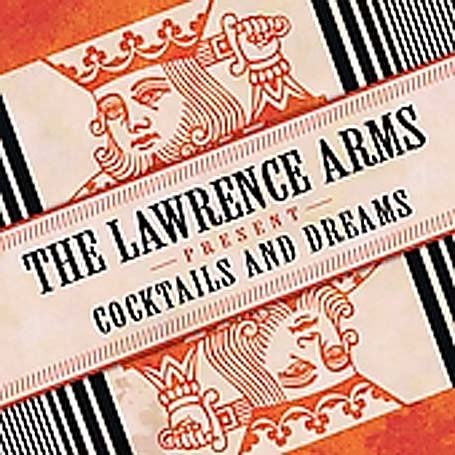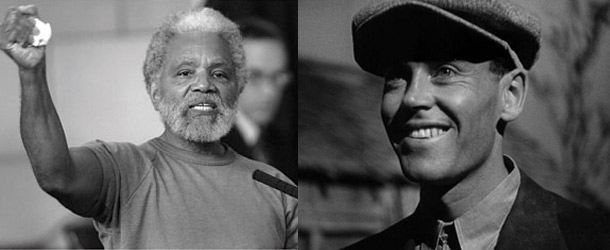In part three of our paranoid series examining how outsiders view Nebraska through song, John Wenz tackles songs from The Lawrence Arms, Tarkio, moe., Braid the Cash Brothers and more.
Note: This is part three of a four-part series. Read parts 1, 2 and 4. And check out the Omaha-focused series here.
by John Wenz
So we're getting into the home stretch … of this part. What, you didn't know this was a trilogy? Shame on you! Only one part remains in this series that examines how artists from outside Nebraska view our state … and yet, we still have yet to find the ultimate Nebraska song. And as this week shows, the competition for the Most Nebraska Song has a clear front runner about Husker Football and a hot three-way tie for runner-up involving outsider composers, lefty-folk singers speaking of economic hardship and Bruce Springsteen singing about murder.

1998 – “Sister Nebraska” by Tarkio off I Guess I Was Hoping for Something More
Colin Meloy’s pre-Decemberists alt-country outfit, a cult band that only came to more prominent light after Meloy’s latter success.
Degrees of Nebraska: 3 / 5
It’s the sounds of leaving Nebraska — and subsequently coming back. “California’s just a memory left behind, and Colorado come and gone, the setting sun paints the rearview mirror red as we start headin' south.” Uh, ok, maybe they’re also geography deficient. But the travelling companion is the aforementioned Sister Nebraska, to whom the narrator assumedly refers with “and all the times you swore that you'd get back there somehow,” and “There” from context clues like “corn” says Nebraska.
But they’re less in Nebraska than going to Nebraska. Maybe.
Portrayal of Nebraska: 3 / 5
Indeteriminate, leaning positive. Obviously the goal of the song is to get back to Nebraska (even if Colin Meloy thinks that it’s south of Colorado) and thus it’s a desirable place to be. Which, let’s face it — if you’re in the town that the Big Black song “Kerosene” was written about, of course you want to be anywhere but there and of course Nebraska seems cooler by comparison.
Overall Quality of Song: 3.5 / 5
Tarkio had its share of fans — most of whom liked the Decemberists first because Tarkio didn’t have near the impact of his later work. The song itself is decently catchy — and does include a banjo — but the lyrics are, on inspection, about what you’d expect from an English major. And trust me, I would know. This was a college band playing a decent song about some form of road trip and “coming home” and isn’t exactly breaking new ground while doing it. It’s also something that doesn’t really hold up to the scrutiny of repeated listening.
Nebraska Index: 9.5 / 15
1998 – “Nebraska” by moe. off Tin Cans & Car Tires
A crowd-pleasing jam band of the same era as Phish and Widespread Panic, moe. remains a cult of cult bands, with fans that call themselves moe.rons with a straight face. I guess.
Degrees of Nebraska: 2 / 5
It seems that the goal is Anchorage, Ala., which is “nice this time of year” — exactly the kind of thing somebody consistently high enough to listen to jam band music would think. They would also, incidentally, think it’s nice on Jupiter “except for the meteors” — despite Jupiter’s red spot being a hurricane larger than our planet that’s lasted hundreds of years. Nebraska itself is the predominant drive through on the journey. It's referred to as flat. Fine, I mean, easy target, dude. But he doesn’t care. Neither do we, dude from moe. You’ve given us little reason to.
Portrayal of Nebraska: 2.5 / 5
He doesn’t care that it’s flat here. That the road is long. Something something. He’ll stay sincere because of his navigator.
It’s deathly dull and takes no real stance.
Overall Quality of Song: 3 / 5
It’s pretty typical jam band fair. Vaguely funky, vaguely rootsy, vaguely sing-alongy. It’s really … not a whole lot of anything. A feel-good hit of some summer or other at some music festival or other and some experience or other … and jam band music is a fairly insular brand of music whose fans seem in on it more so than the outsiders, and thus it’s hard to be an objective judge. But this sounds like somebody getting high in the dorms.
Nebraska Index: 8 / 15

2000 – “Painting Nebraska” by Braid off Movie Music Part Two
A post-hardcore / emo band with plenty of heart to go around, Braid arose out of Urbana-Champaign, Ill. just as bands of similar ilk (Christie Front Drive, The Get Up Kids, The Promise Ring) came to prominence nationally. The band lasted from 1993 to 1999 and have infrequently reunited throughout the next decade.
Degrees of Nebraska: 1 / 5
In the midst of the breakdown of a relationship, all that’s left is … a painting of Nebraska. Why or how one person or the other painted Nebraska remains to be seen, and repeatedly listening to the song after putting myself in the “mindset” (aka drinking Old Crow) didn’t so much reveal the whole story to me as make me tremendously sad.
Portrayal of Nebraska: 2.5 / 5
Apparently, in the dissolution of a relationship, the the focal point of good memories was this painting of Nebraska. So we’ve got that going for us, which is … something.
Overall Quality of Song: 2.5 / 5
My first instinct is to like this song, because, come on — tremendously sad music? Eight ball, corner pocket. And it’s really good mid-'90s emo underground music, and an obvious influence on latter day Urbana folks like American Football. As a song of its genre, it’s perfectly fitting. Good even.
But do you ever get the funny feeling some of the emo scene was the ultimate influencer on later day “nice guy” behavior? See also, the Sady Doyle take down of Weezer. Think of the nice guy as the synchophant who positions his way in relationships as to be the “nice guy,” the sensitive one who is most hurt at the end of the relationship. Sometimes it’s because of "That Bitch." And in songs about the woman striking the blows in the relationship — and given the nature of the music, we’re listening to a potential “nice guy” perspective — it's at least the music fueling “nice guys.”
As a song, this isn’t the worst offender, of course. But early forbearers of emo — for instance, bands like Ian MacKaye’s Embrace — often turned the sadness and introspection inward. While the Music of Self Loathing isn’t exactly an attractive enterprise, lyrics like “I can’t get what I want, I’m a failure” are quite different than, say “We painted a perfect picture together, We sang a song 87 miles long, Do you have some kindness for me?”
Giving Braid the benefit of the doubt, we want those lyrics to be about the bitter walls of ill-communication being thrown up at the end of a relationship. Because often, someone is no longer into it. The affection once felt has been sapped, and the lack of kindness may be emotional exhaustion on what is her end.
Buuuuuuuuuut. And there’s always a but. The last lines, “And everyone who noticed knows, What was so wrong with me, That you left , As I slept, Silently” sounds like Nice Guy 101. Here he just slept — obviously ignoring his own complicity in the end of the relationship and warning signs of unhappiness, instead letting his friends “watch” as he interprets her leaving all in his perspective. Which is … problematic?
Listen, dudes from Braid, live your lives how you want but this just seems a little off.
(After writing this, I became aware of Jessica Hopper’s excellent essay “Emo: Where the Boys Aren’t” and I highly recommend you read it.
Nebraska Index: 6 / 15

2001 – “Nebraska” by the Cash Brothers off How Was Tomorrow
Actual siblings Andrew and Peter Cash make up this Canadian alt-country duo, formed from part of the group the Skydiggers. It’s a Canada thing, apparently.
Degrees of Nebraska: 1 / 5
It’s a break-up song about somebody driving around listening to Bruce Springsteen’s Nebraska, an album that takes 1/10 place in the actual state of Nebraska, chiefly on the song “Nebraska.” While on this scale I’d like to give them points for a Nebraska reference within a Nebraska reference, I can’t in good conscience do so.
Portrayal of Nebraska: 2.5 / 5
That may seem high for a song not about Nebraska, but keep in mind that this rating denotes a scale of negative to positive portrayal, with 2.5 being a mark of value neutral. So this song doesn’t insult us and thus gets the value neutral mark.
Overall Quality of Song: 3 / 5
My life is not significantly changed by this song. It’s average rockist alt-country, with some inflection of country heartbreak with what sounds like a little late-'90s alternarock. I didn’t know a market for such a genre existed, but I guess I get it.
As an aside, I always find it off-putting when songs feel the need to use other songs or albums as a reference point lyrically. For instance, “Ellen and Ben” by the Dismemberment Plan includes a line that says “cause Ellen had my copy of Nebraska” and like, as a music nerd, I get exactly why Travis Morrison was trying to say in that song. She has his copy of Springsteen’s Nebraska. But anyway, on one of those atrocious Song Meaning sites I actually saw kids parse what Morrison meant when he said that line, and pulled out a book much more obscure than a Springsteen book. And thus, are references to Nebraska too insular? And is using the emotions attached to one thing and transplanting it to another thing a cheap lyrical trick?
For instance, some number of years ago, there was a country song called “I Walk the Line Revisited” by Rodney Crowell. The song literally has the refrain “The first time I heard Johnny Cash sing ‘I Walk the Line.’” Which on one level, Crowell was Cash’s son-in-law, though long past the 1998 release of the song (which featured Johnny Cash singing the refrain of his own song as a refrain to that song, so again, song inception.) In fact, when I made a request to a hometown country station to hear actual Johnny Cash, that’s what they gave me instead.
And that’s far from the only country song to reference other country songs or other country artists. Chris LeDoux experienced a career resurgence when Garth Brooks mentioned him on “Much Too Young (To Feel this Damn Old).” But the better question is … Why? Why is this a thing? Is it part of music literacy? A form of name dropping? A shibboleth between artistic audiences?
So anyway, that sort of bugs me about this song. It seems like a cheap lyrical path to take, and doesn’t so much convey emotion as remove audience from emotion because why does the tape of Nebraska matter so much in the grand scheme of things?
Nebraska Index: 6.5 / 15

2001 – “Area Codes” by Ludacris off Word of Mouf
Hailing from Atlanta, Ludacris is a successful and influential 21st century rap artist.
Degrees of Nebraska: 2 / 5
Wikipedia puts this better than I ever could. “The song's lyrics focus on U.S. telephone area codes that denote the location of women with whom the singer has had sexual relations in cities across the United States.” And guess what one of those area codes is? Yeah, 402. It’s toward the end of the song, in between a Virginia and a Maryland area code. Which … why the hell would Luda make a pitstop here? Virginia and Maryland share a border. I mean, I guess maybe they’re not sequential area codes, but …
Portrayal of Nebraska: 2.5 / 5
How you take this depends on how you feel about the behavior in the song. It’s certainly not a song one would describe as female friendly — being rather about sexual conquest nationally and internationally, derogatorily referring to women as "hoes" and at one point using the phrase “whorederves” which also isn’t so positive. As such, he’s participating in value negative behavior with a particular hoe in our state (probably not taking into consideration unequal power balances or something) but he’s not casting our state in a necessarily negative light. He’s barely mentioning it. It’s just another number.
Overall Quality of Song: 3.5 / 5
It’s OK to like problematic things. Problematic things make up half the music industry. Hell, it’s most of the entertainment industry. Can you imagine trying to get all poindexter about the gender roles in this song while the women you’re out with are just trying to dance? I mean, c’mon, there are much less catchy value-negative songs out there. So whatever, just go dance and we’ll have our discussion of misogyny in hip-hop maybe later at the diner. I mean, at least it’s not Nice Guy music. It’s pretty up-front about its player status.
Nebraska index: 8 / 15

2002 – “Nebraska” by Lawrence Arms off Cocktails & Dreams
A fan-adored punk trio signed to Fat Wreck Chords, Lawrence Arms have built a solid reputation since their 1999 start in Chicago.
Degrees of Nebraska: 2 / 5
Some lyrics in the song alude to Nebraska, but it’s as something that the narrator’s friend needs to let go of his anger over. “Let Nebraska disappear in golden flames of grain,” the song says to the troubled friend, struggling with issues of self-loathing.
Portrayal of Nebraska: 2 / 5
I don’t know Mike’s story in this song, really, in the context of Nebraska, and what drove him to such a bad place, and how it all relates to Nebraska, but the song seems to tie it just as much to the place as to the person, that there’s a better life waiting on the outside, that he should want more than this.
Or at least it’s too seemingly tied into the place. For what we know, Mike’s story in the song could be related only tangentially to Nebraska. But I am not entirely sure that’s the case. The place is tied to the internal struggles.
Overall Quality of Song: 4 / 5
As a song of consolation, this is lyrically strong, tying in a lot of the problems experienced by those dealing with depression and self-loathing. There’s a maturity to the Lawrence Arms songs that weren’t always present in those of their Fat Wreck Chords labelmates (though this record was released on Asian Man Records).
Nebraska index: 8 / 15

2005 – “North Platte, Nebras-katte” by Kronos Quartet off U.S. Highball
A string quartet in the “contemporary classical” category, well known for their score on Requiem for a Dream. This particular song comes off U.S. Highway, which features performances of the compositions of outsider composer Harry Partch.
Degrees of Nebraska: 5 / 5
A seeming tale of a journey across Nebraska, with pit stops in Kimball, North Platte, York, Lincoln and Nebraska Jr., a.k.a. Council Bluffs. But it’s in North Platte where refuge is taken for a night, saying, "The Salvation Army. Notice to transients: This city allows you two meals and bed for one night only. Do not leave this place after 6 p.m. By order of the chief of po-lice." The real goal in mind is Chicago, but in this case (at least for this part of the composition) the action is all right here.
Portrayal of Nebraska: 2 / 5
The narrator’s journey causes him to say “To hell with this place.” And a lot of other places too. At this point, it’s hard to tell if it’s Nebraska specific, or more the road weariness of the transient narrating the song. So it’s seemingly hard on Nebraska but stops short of outright condemnation.
Overall Quality of Song: 5 / 5
Harry Partch, as a composer, was sort of what we would call a bit … eccentric. Like many pieces, this was originally meant to be played on Partch’s self-made instruments. However, one key instrument is the vocals in the song, to which the other instruments play a bizarre, chaotic accompaniment. It’s definitely outsider opera, and brilliant and strange all at once.
Nebraska index: 12 / 15
With eight songs to go, we're nearing the final stretch. Can Sawyer Brown's "Nebraska Song" be topped? Will I make more embarrassing admissions of the degree to which I know pop country? And will yet another band have a song about Charles Starkweather? (Dunno yet, probably, yes.)
Stay tuned!
John Wenz apologizes for whatever he told you that one time. It was the NyQuil talking, not him. He can be reached at johnwenz@hearnebraska.org.





